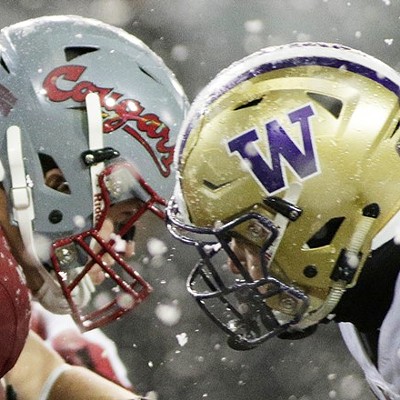Book Review
[
{
"name": "Broadstreet - Instory",
"insertPoint": "5",
"component": "25846487",
"requiredCountToDisplay": "5"
},{
"name": "Broadstreet - Instory",
"insertPoint": "10",
"component": "25846487",
"requiredCountToDisplay": "10"
},{
"name": "Broadstreet - Instory",
"insertPoint": "15",
"component": "25846487",
"requiredCountToDisplay": "15"
},{
"name": "Broadstreet - Instory",
"insertPoint": "20",
"component": "25846487",
"requiredCountToDisplay": "20"
}
]
by Ted S. McGregor, Jr.
As World War II continues to hold that place as America's noblest struggle, our understanding of it is changing. Far from the bloodless depictions of 1950s movies, recent recreations -- films like Saving Private Ryan and the miniseries Band of Brothers -- have taken an unflinching look. Add to this genre the memoir of Wayne MacGregor, a Grangeville, Idaho, attorney who grew up in Spokane during the Depression. In his new book for WSU Press, MacGregor recalls his days in the Pacific in the Army's 77th Infantry Division.
"Once you get into combat, you realize that you're not mainly fighting for 'Liberty, country, and Mother's apple pie.' That's mostly bullshit," writes MacGregor. "You're fighting for the guy next to you in the foxhole and your buddies in the platoon."
That sets the tone for this plain-spoken, often terrifying account. Clearly MacGregor doesn't want to leave the impression that victory was in any way easy. It's ugly, gruesome stuff, but it's the truth.
MacGregor recalls digging foxholes and discovering dead Japanese soldiers instead of soil. You can feel the horror of the sudden realization that one particularly brutal stretch of artillery fire was coming from other American troops. And MacGregor can still remember the blood splashing on his fatigues from Japanese prisoners his squad had hauled around for a week; a battle-crazed GI shot them both in the head the moment they walked into camp.
The centerpiece of this memoir, however, is the battle for Okinawa, a heavily fortified island to the south of Japan. Perhaps the most brutal battle in history, the fight for Okinawa was somewhat overlooked by the American public, since Germany had been defeated only a few days before. On the American side, it was like three 9/11s, with more than 9,600 killed. Nearly 90,000 Japanese perished there as well.
Were there lessons to be learned? MacGregor is no pacifist; he believes that the war was just and that the Japanese paid a terrible price for the greed and pride of their leaders. Still, from what he saw, there's got to be a better way.
"If people everywhere could see what the residue of battle consists of -- the bodies of their soldiers, their children, lying torn asunder, flesh decaying and falling off the bones, and insects, birds, and other animals feeding on the decomposing corpses -- perhaps it would cause a revulsion, a loathing, an abhorrence of such magnitude that wars would become obsolete."
Publication date: 02/06/03
As World War II continues to hold that place as America's noblest struggle, our understanding of it is changing. Far from the bloodless depictions of 1950s movies, recent recreations -- films like Saving Private Ryan and the miniseries Band of Brothers -- have taken an unflinching look. Add to this genre the memoir of Wayne MacGregor, a Grangeville, Idaho, attorney who grew up in Spokane during the Depression. In his new book for WSU Press, MacGregor recalls his days in the Pacific in the Army's 77th Infantry Division.
"Once you get into combat, you realize that you're not mainly fighting for 'Liberty, country, and Mother's apple pie.' That's mostly bullshit," writes MacGregor. "You're fighting for the guy next to you in the foxhole and your buddies in the platoon."
That sets the tone for this plain-spoken, often terrifying account. Clearly MacGregor doesn't want to leave the impression that victory was in any way easy. It's ugly, gruesome stuff, but it's the truth.
MacGregor recalls digging foxholes and discovering dead Japanese soldiers instead of soil. You can feel the horror of the sudden realization that one particularly brutal stretch of artillery fire was coming from other American troops. And MacGregor can still remember the blood splashing on his fatigues from Japanese prisoners his squad had hauled around for a week; a battle-crazed GI shot them both in the head the moment they walked into camp.
The centerpiece of this memoir, however, is the battle for Okinawa, a heavily fortified island to the south of Japan. Perhaps the most brutal battle in history, the fight for Okinawa was somewhat overlooked by the American public, since Germany had been defeated only a few days before. On the American side, it was like three 9/11s, with more than 9,600 killed. Nearly 90,000 Japanese perished there as well.
Were there lessons to be learned? MacGregor is no pacifist; he believes that the war was just and that the Japanese paid a terrible price for the greed and pride of their leaders. Still, from what he saw, there's got to be a better way.
"If people everywhere could see what the residue of battle consists of -- the bodies of their soldiers, their children, lying torn asunder, flesh decaying and falling off the bones, and insects, birds, and other animals feeding on the decomposing corpses -- perhaps it would cause a revulsion, a loathing, an abhorrence of such magnitude that wars would become obsolete."
Publication date: 02/06/03





















